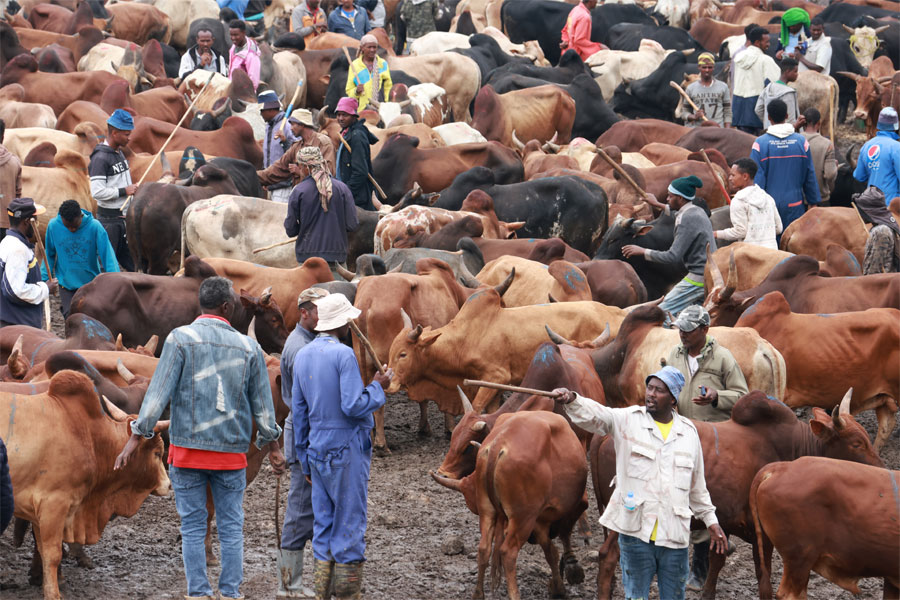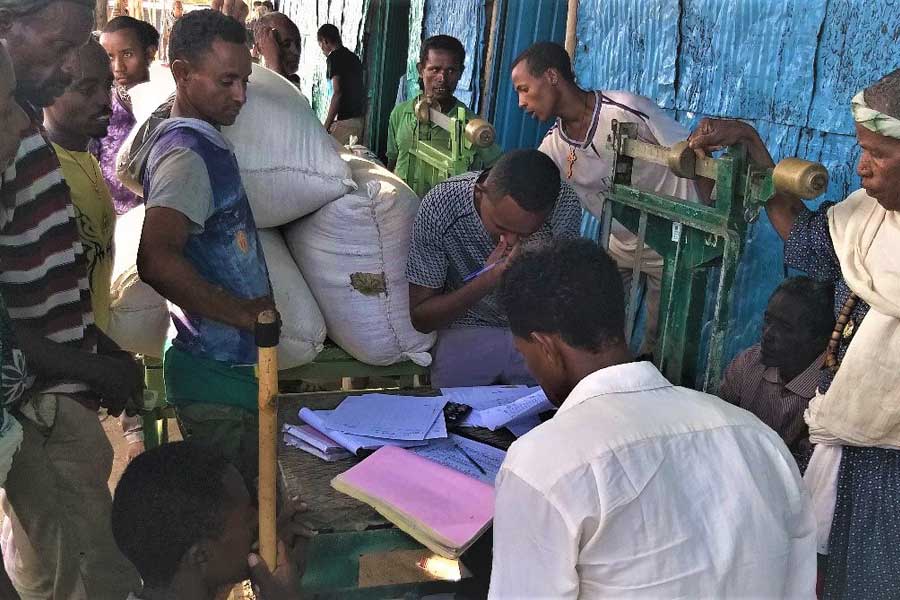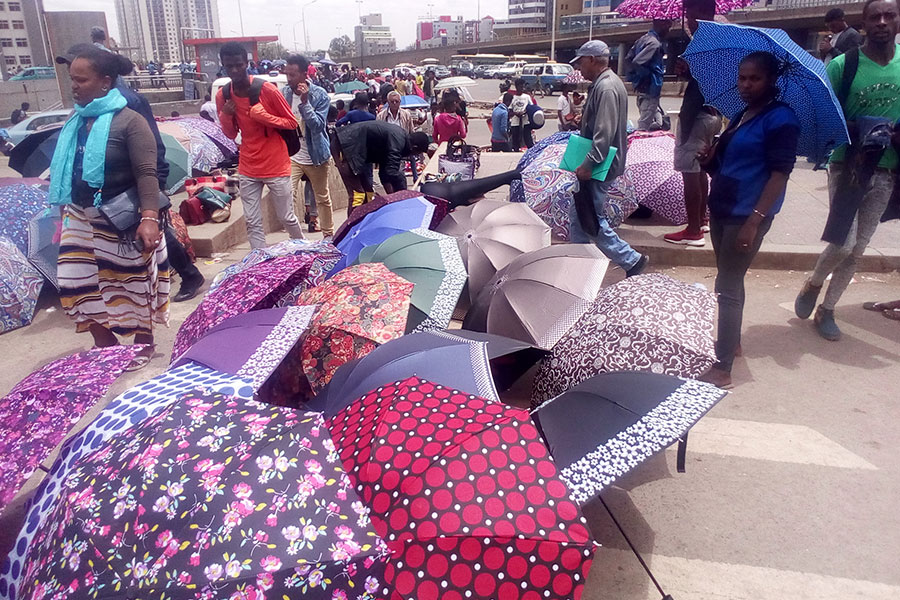
Radar | Oct 03,2020
It was such an outrageously windy and sunny day in March; the clouds on the horizon were shaded with blighted, glaring white. The day was both a majestic mixture of patches of clouds with the sun; it was supposed to be a good day. But not for Abebech Feleke, 20, who is lying under the shade of a tree inside Yassin Legesse Johnson Flower Farm.
Abebech, who has been working at Yassin Legesse Johnson Farm for the last 14 months, now observes the rose farm filled with nothing more than cut buds.
Following the outbreak of the Novel Coronavirus (COVID-19), Ethiopia’s flower market is staring at a collapse due to the disruption the virus inflicted on the global economy.
Yassin Legesse Johnson Farm, owned by Yassin Legesse, is one of the 12 flower farms located on the outskirts of Bishoftu (Debrezeit) that has been losing over 140,000 Br a day for the last three weeks in light of the Coronavirus.
“I have never seen such a depressing season in my 13 years of working on this farm,” said Yohannes Akale, production manager at the Farm that had a turnover of three million euros in the last fiscal year.
“We're operating at a loss, since Europe became the epicentre of the virus, incurring costs from labour, chemicals and fertilisers and running pumps and generators,” added Yohannes.
The 14-year-old farm, which has a daily production of 90,000 stems, employs over 500 people with main export destinations in Holland, Sweden, Germany, Canada and the United States.
“Letting go of employees isn’t an easy decision,” he said.
The company laid off 60 employees whose contract period is less than two months after paying their salaries. It also gave a two-week annual leave to 70 employees.
“I support my parents through the wage I get from working here," Abebech said, "and if things continue at this pace, I’m unsure of a future working here."
One of the workers pushes a cart stacked with bundles of flowers toward the dumping site at Yassin Legesse Johnson Flower Farm.
Ethiopia, which is the second-largest flower exporter in Africa next to Kenya, has over 72 active flower farms that are involved in the production of different varieties of flowers. Horticulture contributes close to 31pc to the agricultural export sector.
The horticulture industry in the country has over 126 investments and employs over 150,000 citizens in the export of flowers, fruits, herbs and vegetables that generated over 300 million dollars in the last fiscal year.
Among the 11 flower farms in Bishoftu, Joy Tech Plc is the only flower farm that has a production line of herbs and summer flowers that are affected by the pandemic.
With the reduced number of flights, the volume of summer flowers and herbs have been decreasing with only 30tn of herbs exported three weeks ago, according to Bisrat Hailselassie, farm manager at Joytech Fresh, which currently operates on 100ha and employs over 1,300 people.
As a result, from 26 different kinds of herbs, 22 varieties have been discarded, and the company was forced to completely uproot three hectares of summer flower production from a total of 11ha.
“It’s a tough decision to uproot as it takes six months to re-grow the parent plant," said Bisrat.
The farm’s summer flower and herbs production mainly lands in Germany, Norway, Belgium, Holland and the United Kingdom. The summer flowers are sold on auction in Germany.
“Currently, we're conducting a field rejection where the flowers are cut as soon as they grow hence they are rejected right in the field, and this has an immense cost," he said. "The only option is to grant annual leave to employees who have it."
Close to 15pc of the total employees have taken their leave so far this month, according to Bisrat.
The 16-year-old farm incurred a loss of more than one million dollars in the last three weeks.
“One of our biggest costs is transportation; hence, we expect the flight rates to be adjusted for us to maintain the current 30pc direct sales,” added Bisrat.
On average Ethiopian Airlines uses two planes to fly flowers and herbs out daily. At peak seasons, this can reach up to four planes with a rate of 1.72 dollars a kilogram. Currently, there is one plane that is flying to both Liège, Belgium and Frankfurt, Germany daily carrying less than its capacity.
"With the current volume we're exporting," said Bisrat, "we expect the flight rates to be adjusted following the current situation."
In normal times, Ethiopia exports more than 160tn of different varieties of flowers a day mainly to Europe, the United States, Japan and Canada.
Amidst this disruption, the Ethiopian Horticulture Producers & Exporters Association wrote a letter to the Office of the Prime Minister two weeks ago detailing the dire situation the sector is currently facing.
At the beginning of last week, the Association and exporters held a deliberation with Girma Birru, board chairperson of Ethio telecom and the central bank and a member of the macroeconomic team at the Office of the Prime Minister, and Oumer Hussein, minister of Agriculture.
The Association, at the behest of the exporters, has requested that banks assist the sector by availing cash to cover their operating costs in these tight times. Additionally, the industry appealed for loan rescheduling and reclaiming the Value Added Tax (VAT) returns.
A few days after the discourse, the Office of the Prime Minister lifted the minimum price of selling flowers set out by the National Bank of Ethiopia and said it would expedite VAT returns. Currently, the Central Bank of Ethiopia issues a minimum price of 3.89 dollars a kilogram for the export of flowers.
“We have sales of less than 20pc where the price of the flowers has dropped, and we hope it will at least cover the production cost," said Zelalem Melese, president of the Association and owner of ZK Flowers Plc. "Hence, with the uncertainty of the market, there is no chance we would be able to fill this threshold, which is why we have addressed it in our meeting."
The sector is quite different from other industries, because of the easily perishable nature of the product. Regardless, production must resume at all costs, according to Oumer, minister of Agriculture.
“After the meeting, we have decided that the production of the flowers must resume and be dumped after harvest, as there is no other option to keep the employees,” he added. “And the workforce will not be laid-off from their jobs.”
To maintain this, the Ministry will ensure the supply of the chemicals and fertilisers and provide them to the growers without adding profits, according to the Minister.
The issue of working capital and loan rescheduling is to be addressed through the Ministry of Finance and the banks. Currently, the effect of the expenses is being discussed in detail, according to Oumer.
Looking at the current conditions, we expect there might even be a 100pc halt of the exports, since the sector by itself is vulnerable, according to Dereje Zebene, president of Zemen Bank, which had a net profit of 489.8 million Br and total assets of 14.7 billion Br.
"We're very much willing to help them out as long as different policies are loosened up by the government," said Dereje, who believes that the release of the NBE bill will address at least some of the cash concerns of the banks. "We've also recommended the slashing of the savings rate to two percent, which will automatically reduce the lending rate significantly."
It is an excellent thing that the government is aiding the sector by listening to their concerns; however, there is also a concern that availing the NBE bills will increase inflation, according to a macroeconomist who wanted to remain anonymous.
"However, this shouldn't be the concern right now, as it's very urgent to address the economic problem of the country," the expert said.
The macroeconomist recommends the Ministry of Agriculture come up with a better solution about the field rejection of the flowers.
PUBLISHED ON
Mar 28,2020 [ VOL
20 , NO
1039]

Radar | Oct 03,2020

Agenda | Sep 09,2023

Agenda | Nov 21,2020

Editorial | Apr 04,2020

Commentaries | Mar 01,2024

Viewpoints | Apr 15,2023

Commentaries | Jun 08,2019

Radar | Apr 13,2019

Fortune News | Oct 21,2023

Viewpoints | Sep 04,2021

Dec 22 , 2024 . By TIZITA SHEWAFERAW
Charged with transforming colossal state-owned enterprises into modern and competitiv...

Aug 18 , 2024 . By AKSAH ITALO
Although predictable Yonas Zerihun's job in the ride-hailing service is not immune to...

Jul 28 , 2024 . By TIZITA SHEWAFERAW
Unhabitual, perhaps too many, Samuel Gebreyohannes, 38, used to occasionally enjoy a couple of beers at breakfast. However, he recently swit...

Jul 13 , 2024 . By AKSAH ITALO
Investors who rely on tractors, trucks, and field vehicles for commuting, transporting commodities, and f...

Jul 5 , 2025
Six years ago, Ethiopia was the darling of international liberal commentators. A year...

Jun 28 , 2025
Meseret Damtie, the assertive auditor general, has never been shy about naming names...

Jun 21 , 2025
A well-worn adage says, “Budget is not destiny, but it is direction.” Examining t...

Jun 14 , 2025
Yet again, the Horn of Africa is bracing for trouble. A region already frayed by wars...